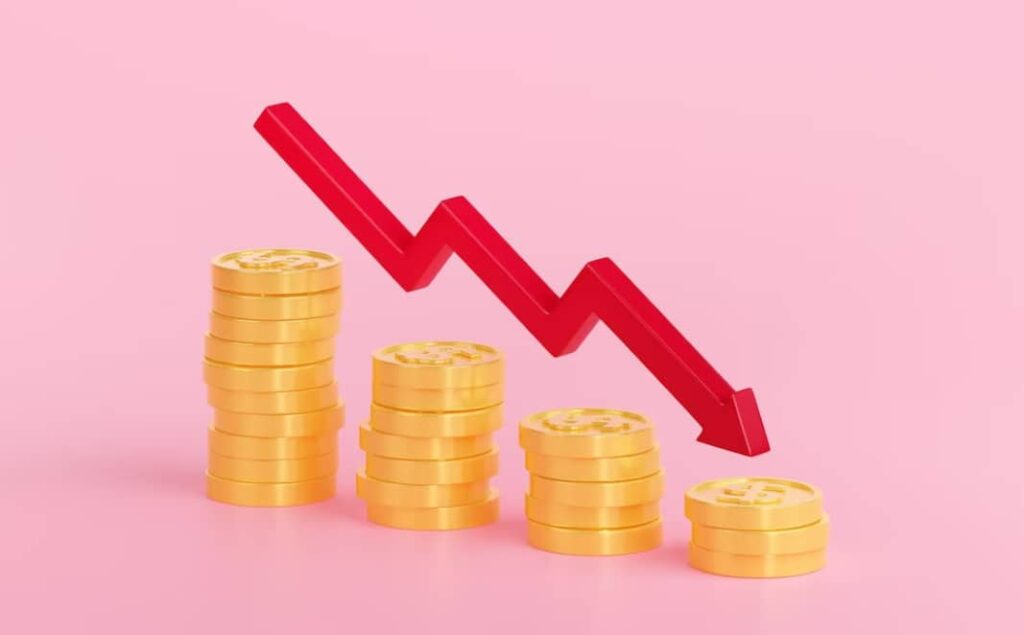Increasing interest rates, soaring inflation rates, an inverted yield curve, and persistent supply chain disruptions all suggest the potential for an economic downturn. While this may raise concerns, it’s important to recognize that economic conditions are dynamic, and a minor setback does not necessarily foreshadow a significant recession.
Nevertheless, statistical probabilities indicate that individuals will likely encounter at least one recession during their lifetime. In preparation for such scenarios, relying on luck or making impulsive financial choices is ill-advised. An impending recession presents an opportune moment to reassess investment strategies and explore avenues for constructing a resilient portfolio capable of weathering economic turbulence.
The Essence of Recessions
An economic downturn, widely recognized as a recession, is characterized by a significant and prolonged decline in economic activity spanning at least two quarters. This downturn is identified through a decrease in the Gross Domestic Product (GDP), adversely affecting employment, production, retail sales, and household income.
Various factors can precipitate a recession, with economic imbalances often at the core. External pressures, such as geopolitical conflicts like the Ukraine war, reduced consumer spending due to inflation, or the collapse of a housing market bubble, can trigger these downturns.
Recessions frequently coincide with a bear market, where stock values fall by 20% or more.
As a recession unfolds, consumer expenditure on discretionary items falls, triggering a cascade of negative effects on economic growth. Businesses may experience a downturn in earnings, prompting them to cut costs, including workforce expenses, in anticipation of challenging times ahead.
While the National Bureau of Economic Research (NBER) is responsible for officially declaring a recession, some economists may recognize the signs of a recession or its conclusion ahead of such announcements.
The Influence of a Recession on Financial Markets

The onset of a recession often triggers a wave of investor anxiety, leading to rapid shifts in the financial markets as assets are liquidated in favor of more stable investments. This flight from riskier assets, such as stocks, to perceived safer options like government bonds, precipitates a decline in stock prices. Additionally, economic downturns can lead to increased job layoffs, prompting homeowners to sell properties at reduced prices, which in turn affects the real estate market’s value. Furthermore, reduced consumer spending during these times hits nonessential businesses hard, impacting investments in these sectors.
However, it’s important to note that the impact of a recession varies across different industries. While sectors heavily reliant on discretionary spending, such as travel and luxury goods, tend to suffer, essential services like food and healthcare may see stability or even growth during economic downturns.
Given the unpredictable nature of recessions, including their onset and severity, the most prudent approach for investors is to develop a diversified and recession-proof investment portfolio. This strategy aims to mitigate the adverse effects of economic downturns, ensuring a more stable financial position through uncertain economic times.
What Makes a Portfolio Recession-Proof?
Volatility in the stock market is an unavoidable reality. Across all sectors, businesses experience natural fluctuations as the economy expands and contracts.
However, when a recession hits, it’s the nonessential businesses that bear the brunt of the impact. These are known as cyclical businesses, as their value is heavily dependent on consumer spending.
Conversely, industries that provide essential products and services such as food, electricity, and healthcare tend to fare better during economic downturns. These sectors are often deemed recession-proof due to their stability and historical outperformance during recessions.
One effective strategy to safeguard your portfolio during a recession is diversification. Including stocks with a track record of performing well during economic downturns can help mitigate risk.
Nevertheless, it’s crucial to acknowledge that a recession-proof portfolio has its advantages and disadvantages. Maintaining a balanced approach is key; it’s essential not to overemphasize assets that excel solely during recessions. While certain high-growth stocks may deliver short-term gains, they may falter during periods of economic expansion.
Building a Recession-Resilient Investment Portfolio
Prior to adjusting your investment strategy for recession resilience, it’s prudent to assess the current economic environment. During a recession’s peak, it may be wise to pause any major changes in your asset allocation until the economic landscape stabilizes.
Fortunately, regardless of your risk tolerance, there are strategies to safeguard your investments without losing sleep over potential market downturns.
Enhancing Portfolio Diversification
The adage about not placing all your eggs in one basket is especially pertinent in investment. While there are anecdotes of individuals striking it rich with early investments in companies like Apple, such outcomes are rare.
It’s risky to depend solely on the success of a single stock. If you’re already participating in the stock market, consider diversifying by incorporating high-dividend stocks, mutual funds, and exchange-traded funds (ETFs) focused on consumer staples such as groceries and healthcare products. These sectors often perform better than cyclical ones during economic downturns.
Moreover, if your investments are solely in the public stock market, it’s time to diversify by exploring other asset classes. Diversification introduces variety, which can be crucial for investment success.
Diversification is key to mitigating the impact of market volatility during a recession. For those not nearing retirement, focusing on long-term investments can help build a robust portfolio capable of enduring economic challenges.
Real Estate Investment Considerations
The allure of investing in real estate during a recession, attracted by lower prices, can be strong. However, it’s generally advisable to avoid making new real estate investments during a downturn unless you have substantial cash reserves.
- If you already possess real estate or can afford to invest in premium markets at their peak, these assets can prove beneficial. Despite potential short-term value decreases, real estate in prime markets often recovers quickly post-recession;
- Real estate isn’t the most liquid asset, but for those not overly leveraged, accessing equity from property can provide a safety net against job loss or other emergencies, allowing for further investment;
- Exercise caution when investing in real estate; not all properties fare equally in a volatile market;
- Rental properties, providing passive income and stable cash flow, can be more resilient than vacation homes, given the constant demand for housing.
Investing in Defensive Sector Funds
Historical recessions, including the pandemic, have highlighted that certain businesses are more recession-resistant. Companies fulfilling essential consumer needs typically maintain stability despite economic fluctuations.
Defensive sector funds, which are mutual funds and ETFs investing in such recession-resistant sectors, can offer a safer haven during economic downturns.
While nonessential services like entertainment, luxury retail, and travel may struggle, essential service providers often sustain solid balance sheets and cash flow, making investments in these areas potentially more secure during challenging economic times.
- Healthcare Services: Healthcare remains indispensable regardless of economic conditions. Whether in a recession or not, the demand for medicine, insurance, medical professionals, and related products persists;
- Grocery Stores: With the necessity of food and household essentials like toilet paper, grocery stores remain resilient during economic downturns. Compared to dining out, grocery shopping is a more cost-effective option, making grocery stores recession-resistant businesses;
- Utilities: Utilities rank among essential services, with heating, hot water, and electricity being top priorities for households. This category also encompasses services involved in infrastructure construction and maintenance, further solidifying its recession resilience.
When investing in defensive markets, remember the importance of diversification. While these investments may yield slower growth, spreading your investments across them can be highly effective.
According to Warren Buffett, investing involves laying out money now to gain more in the future. While high-yield stocks may offer short-term excitement, they might not be the optimal choice for long-term investments, particularly for retirement planning. Consistent and steady growth often outperforms in the long run.

Reevaluate Your Investment in Precious Metals
For centuries, the allure of precious metals like silver and gold has captivated humanity ever since the discovery of the first gleaming nugget. Despite their average performance during economically stable times, many overlook the inclusion of precious metals in a recession-proof investment strategy.
As markets plummet, the allure of these metals shines brighter, becoming a refuge for investors amid economic uncertainty and bolstering their worth.
Investing in precious metals can take the form of purchasing tangible bars or opting for funds that specialize in a single metal or a diverse assortment of them.
Establish a Financial Safety Net
It’s widely advised by financial experts to set up an emergency fund. If you’re already on this path, excellent. If not, it’s crucial to begin investing in your financial security without delay.
Unexpected economic downturns can impact anyone, regardless of their current financial stability. Job losses, market crashes, and having an emergency fund can provide the peace of mind and financial security to navigate through tough times without the need to prematurely liquidate investments.
Retirees, in particular, face heightened risks during market downturns. A financial cushion offers additional security, aiding in asset liquidation or if a significant portion of funds are tied up in fluctuating markets.
Adopt a Patient Approach
- Facing a potential recession, the key is to remain calm. Investment values fluctuate over time, and by preparing your portfolio for downturns, you can have confidence in your planning;
- However, it’s crucial to stay proactive with your investments. Keep your goals in check, ensuring they’re in line with your long-term aspirations to avoid rash decisions;
- Remember, recessions are temporary, and economic recovery is inevitable.
Leverage Technology in Managing Your Portfolio
With a strategy in place for a resilient portfolio, the next step is tracking your investments efficiently. Given the diversity of your investments, from real estate to ETFs, precious metals, and sector-specific funds, managing everything can become daunting.
Taking a comprehensive approach to portfolio management minimizes the risk of missed opportunities or ill-informed decisions regarding asset transactions.
Utilizing technology that consolidates all your investment information will keep you informed with the latest data, allowing for informed decision-making based on current trends.
Conclusion
In conclusion, safeguarding your financial future against economic downturns involves creating a well-diversified and strategic portfolio. This includes a mix of investments from different sectors, asset types, and risk levels. It’s also important to maintain an emergency fund and leverage technology for accurate and real-time management of your portfolio. Remember, patience is key during economic fluctuations. By following these strategies, you can secure your investments and confidently weather any future recessions.




















+ There are no comments
Add yours